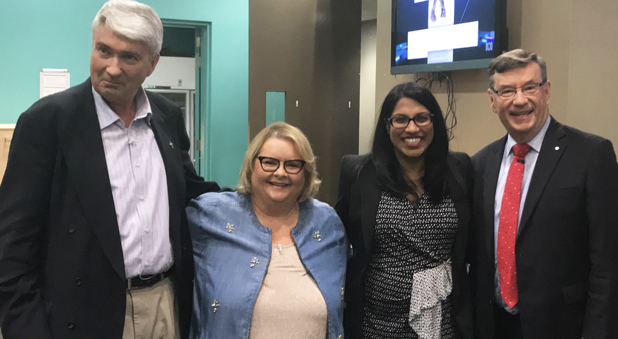Archbishop Glenn Davies has told a national television audience that he and other church leaders would recognise same-sex marriage as law if the postal survey voted for it, but they would continue to uphold God’s design for marriage.
Dr Davies’ appearance on the ABC’s Q&A program came just a week after the end of the Synod, in which he spoke passionately on the issue. “Some have questioned whether the money would have been better spent on social justice issues [feeding the poor, Sydney’s homeless, refugees etc],” he said at Synod. “The reality is, however, that our participation in the Coalition for Marriage is not at the expense of our commitment to social justice, but because of it. We believe the best way for Anglicare and other Christian agencies to serve the social good is for them to be able to operate on the basis of a Christian ethos and to recruit Christian staff and volunteers. A legal recognition of same-sex marriage will significantly affect Anglican bodies who wish to maintain and promote a Christian understanding of marriage in opposition to the law of the land.”
In a letter to churches, Dr Davies added: “Our Anglican bodies make a real difference to Australian lives, worth hundreds of millions of dollars. Compare that with an investment of just $1 million to help ensure that this vital work continues in the future”.
Later, on Q&A, the Archbishop defended the right of Christians to express a view in the debate. “Christians have a right to speak. And they don’t have more of a right to speak than anyone else, nor less of a right to speak. And what we want to do is actually bring to the light what we believe marriage is.
“After all, from my point of view, it’s God’s idea, and Jesus’ view of marriage is the view that I want to follow. That’s how I come to the view that I come to. And I want to recommend that to the people of Australia. In fact, I’d rather have more people follow Jesus than even be concerned which way they’re going to vote.”
Issues of religious freedom came to the fore in the debate, with overseas examples of restrictions of religious freedom. Even “Yes” vote panellist, Catholic priest Father Frank Brennan, acknowledged the need for broader protection for religious freedom if same-sex marriage was legalised.
On the night the survey figures are released, November 15, Dr Davies will be speaking at a fundraising event for the Freedom for Faith think tank at St Andrew’s Cathedral. Dr Davies told Q&A that when the plebiscite was being considered, he promised the Prime Minister that if the vote was “Yes”, church leaders “would recognise that would become the law of the land’.
“However, I won’t stop saying what Jesus defines marriage to be and how God has designed marriage,” he said. “I would be prepared to go to jail if necessary in order… so I have an opportunity and a right as a citizen in this country, which loves free speech, freedom of conscience, freedom of belief, so that I can actually say what I believe, even though the law might be different.
“Whether it be abortion or same-sex marriage or euthanasia – if Victoria was to go down that, in my view, foolish track, then we will be in that situation. So we will accept what the people say because we believe in democracy.”

























